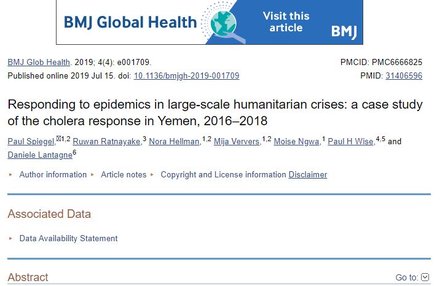
Background
Large epidemics frequently emerge in conflict-affected states. We examined the cholera response during the humanitarian crisis in Yemen to inform control strategies.
Methods
We conducted interviews with practitioners and advisors on preparedness; surveillance; laboratory; case management; malnutrition; water, sanitation and hygiene (WASH); vaccination; coordination and insecurity. We undertook a literature review of global and Yemen-specific cholera guidance, examined surveillance data from the first and second waves (28 September 2016–12 March 2018) and reviewed reports on airstrikes on water systems and health facilities (April 2015–December 2017). We used the Global Task Force on Cholera Control’s framework to examine intervention strategies and thematic analysis to understand decision making.